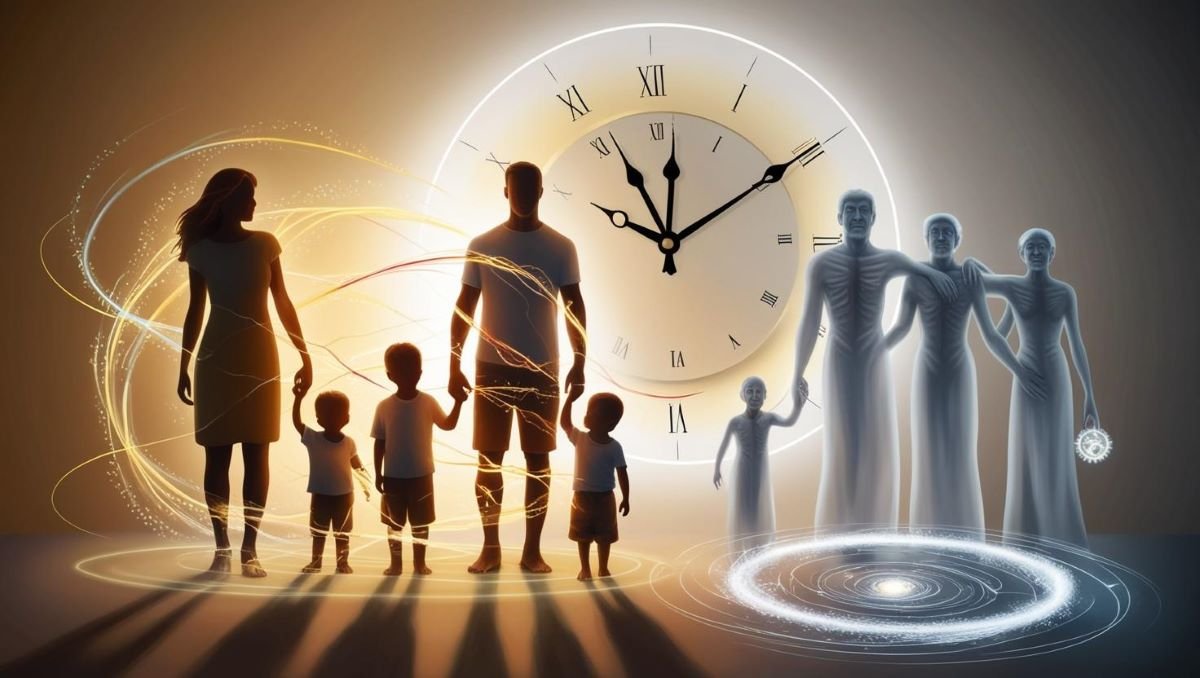
Karmic debt is a fascinating and often complex concept, deeply rooted in the belief that the actions we take in one life can influence future lifetimes. But did you know that karmic debt doesn’t only affect us individually? It can extend to our families, shaping the relationships and dynamics between loved ones across generations. Understanding how karmic debt shows up in families can empower us to break the cycle and foster healthier, more harmonious relationships. Let’s dive into this profound topic, explore how karmic debt manifests, and uncover ways to heal and transform these family patterns.
Table Of Contents
- What is Karmic Debt?
- Karmic Debt and Family Dynamics
- Identifying Karmic Cycles in Families
- Breaking the Cycle: Practical Steps
- The Role of Soul Contracts in Family Karma
- How Generational Karma Affects Children and Future Generations
- Conclusion: Breaking Free from Karmic Debt
What is Karmic Debt?
Karmic debt refers to the concept that actions in our past, whether from this life or previous lifetimes, create a kind of “debt” that must be balanced or repaid through future actions. It is the principle of cause and effect, where every action—positive or negative—leaves an imprint on our soul. If we carry unresolved or harmful actions, this debt follows us, and it may appear in our relationships, family dynamics, and overall life experiences.
Repeating Negative Patterns:
- Conflict: Continuous arguments over similar issues without resolution.
- Abandonment: Fear of abandonment that leads to unhealthy attachment or avoidance.
- Betrayal: Repeated experiences of feeling betrayed by loved ones, even when trust is rebuilt.
- Control Issues: Patterns of trying to control or manipulate loved ones, often due to past life unresolved power struggles.
Reoccurring Emotional Wounds that Remain Unhealed:
- Fear of Intimacy: Constantly pushing people away despite desiring deep connections, stemming from past betrayal or abandonment.
- Insecurity and Low Self-Worth: Repeated experiences of feeling unworthy or unloved due to early family dynamics.
- Guilt and Shame: Unresolved feelings of guilt, especially in parent-child relationships, where one feels responsible for the unhappiness or failures of others.
- Trust Issues: Chronic mistrust, even in the face of no evidence, based on past betrayals or broken promises.
Unresolved Issues Between Family Members from Previous Generations:
- Generational Trauma: Parents or grandparents’ unresolved conflicts or trauma manifesting in the current generation’s behavior, affecting relationships.
- Inherited Anger or Resentment: Passed-down bitterness between siblings, or from parents to children, from unresolved family issues.
- Unspoken Family Secrets: Hidden family histories that cause confusion or tension, creating distrust and misunderstandings.
- Unhealed Parent-Child Dynamics: Dysfunctional relationships between parents and children continuing from one generation to the next, creating cycles of emotional neglect or overprotection.
- Patterns of Divorce or Separation: Families where multiple generations experience similar relationship breakdowns or cycles of divorce, reinforcing emotional distance and detachment.
Karmic Debt and Family Dynamics
Family relationships are unique in that they often carry the weight of not just current-life experiences, but also past-life ones. Karmic debt can pass down through generations, manifesting as repeating patterns of behavior, unhealed emotional wounds, or unresolved conflicts. These unresolved debts can be carried by one or more members of a family, making it difficult to break free from destructive cycles.
Inherited Patterns of Behavior:
- Generational Trauma:
- Emotional wounds, like unresolved grief or PTSD, are passed down from one generation to the next, creating a cycle of pain that affects family dynamics.
- For example, children of abusive parents may struggle with self-worth or seek out toxic relationships as adults, perpetuating the trauma.
- Repeating Relationship Conflicts:
- A parent’s unresolved abandonment issues may lead to a child subconsciously choosing partners who emotionally neglect or abandon them, recreating the pain.
- Children of parents with poor communication skills may struggle with expressing themselves clearly, perpetuating misunderstandings in their own relationships.
- Patterns of Addiction:
- Addictive behaviors (e.g., alcohol or drug dependency) may pass through generations, with children of addicts more likely to adopt similar coping mechanisms.
- Families may normalize unhealthy habits, such as excessive drinking, and unconsciously teach children to cope with stress in the same way.
- Emotional Repression:
- In some families, emotions like sadness, anger, or fear are suppressed or ignored, leading to children growing up without proper emotional expression.
- These children may struggle with their own emotions later in life, repressing feelings or having difficulty with emotional vulnerability in relationships.
- Self-Sabotaging Behaviors:
- A family history of failure or low expectations may cause children to subconsciously believe they don’t deserve success, leading to self-sabotaging choices.
- This behavior can manifest in romantic relationships, where individuals may choose partners who reinforce their sense of unworthiness.
- Parenting Styles:
- Parenting practices, such as overprotectiveness or neglect, often repeat across generations, shaping how children treat their own kids.
- For instance, a child who was raised with harsh discipline may parent with similar authoritarian methods, continuing the cycle of rigid control.
- Financial Struggles:
- If financial instability or poor money management is ingrained in family culture, future generations may inherit anxiety or poor financial habits, like overspending or avoidance.
- Children from financially stressed households might develop a scarcity mindset, which affects their relationship with money and relationships.
Identifying Karmic Cycles in Families
Recognizing when karmic cycles are at play in family dynamics is crucial for breaking the cycle. Sometimes, these cycles can feel so deeply embedded in family life that it seems impossible to escape. However, by looking at recurring patterns, emotional dynamics, and unresolved issues, we can begin to identify the karmic debts that need healing.
Signs of Karmic Cycles:
- Repeating Conflicts:
- If the same issues or arguments keep resurfacing in family interactions without resolution, it suggests a karmic loop that needs healing.
- Emotional Baggage:
- Unresolved emotional wounds, such as lingering resentment or hurt from past relationships, may be carried forward and manifest as karmic debt.
- Intergenerational Issues:
- Recurring struggles such as poor health, financial difficulties, or relationship challenges in each generation point to unresolved karmic patterns that need addressing.
- Emotional Triggers:
- Intense emotional reactions to situations that seem minor can signal the activation of unresolved karmic debts from the past.
- Sense of Repetition:
- Feeling like you are stuck in the same life situations or relationships over and over again is often a sign of karmic cycles that need to be broken.
- Unexplained Reactions:
- Having strong emotional responses to people or situations that you cannot logically explain may indicate an unresolved karmic link.
- Frequent Feelings of Guilt or Regret:
- Overwhelming guilt about past actions or decisions, even if they occurred in a past life or earlier in life, could point to karmic debt needing resolution.
- Unresolved Family Secrets:
- Hidden truths or unspoken issues within the family that keep resurfacing may be signs of karmic patterns needing to be acknowledged and healed.
- Unexpected Life Patterns:
- Experiencing life events or patterns that seem coincidental but repeat over time (e.g., always being in toxic relationships) is often a sign of karmic influences at play.
Emotional Triggers:
- Overreaction to Minor Issues:
- When small, insignificant situations provoke intense emotional responses, it could indicate that past unresolved karmic debt is being triggered.
- Feeling Unexplained Fear or Anxiety:
- Sudden, unexplained feelings of fear or anxiety about situations or people that don’t warrant them might be linked to past unresolved karmic lessons.
- Chronic Resentment:
- Carrying long-lasting resentment toward certain people or situations, even when it seems disproportionate to the current circumstances, can point to karmic debt.
- Uncontrollable Anger:
- Explosive anger or rage that seems to “come out of nowhere” might be a sign of past unresolved emotional wounds surfacing as karmic triggers.
- Unresolved Grief:
- Deep, lingering sadness or grief over past losses, even those that occurred long ago, could indicate that karmic emotional debts are at play.
- Reactivity to Certain People:
- A strong emotional reaction to specific individuals, especially family members, that doesn’t match the current situation, might be due to a karmic bond or debt.
- Feeling of Injustice:
- Consistently feeling that you have been wronged or treated unfairly, without any clear reason, could point to karmic cycles of perceived injustice.
- Inability to Forgive:
- A deep inability to forgive, even when there’s a desire to move on, can indicate unresolved karmic lessons that involve forgiveness.
Breaking the Cycle: Practical Steps
Once you recognize the presence of karmic debt within your family, the next step is to work toward breaking the cycle. This requires awareness, intentional action, and sometimes, the help of spiritual practices or professional guidance. Here are some key steps you can take to heal karmic wounds and transform family dynamics:
1. Acknowledge the Debt:
- Examine Repeated Patterns:
Pay attention to recurring patterns in your relationships. Recognizing these patterns helps in identifying karmic debts that need to be addressed. - Accept Personal Responsibility:
Take responsibility for your role in the karmic cycle. Acknowledging where you have contributed to the pattern empowers you to change it. - Seek Truth and Clarity:
Look for the deeper truths behind family conflicts and struggles. Sometimes the root of karmic debt lies in past life actions or generational misunderstandings.
2. Forgiveness and Healing:
- Release Negative Emotions:
Practice letting go of anger, hurt, and resentment, as holding onto these negative emotions keeps the karmic cycle alive. - Cultivate Self-Love and Compassion:
Healing begins within. By nurturing yourself with love and compassion, you create space for healing within your family dynamics. - Create New Rituals:
Establish new, positive rituals with family members that promote healing. Simple acts like family meals or shared moments can rebuild trust and love. - Set Boundaries:
Set healthy emotional boundaries with family members. Protecting yourself from toxic patterns helps to prevent further karmic debt from accumulating.
3. Soul Contracts and Lessons:
- Reframe Challenges as Opportunities:
View challenges, especially with family, as lessons designed for personal and spiritual growth. This mindset shift allows you to break free from old karmic cycles. - Embrace Patience:
Understand that healing is a process, and karmic lessons may take time to fully unfold. Embrace patience and trust the process. - Self-Reflection and Growth:
Engage in regular self-reflection to gain insights into how your actions and behaviors are connected to karmic cycles. Self-awareness leads to positive transformation. - Healing from Past Lives:
Sometimes karmic debt stems from past lives. Consider exploring past life regression or working with a spiritual guide to clear unresolved karma from previous incarnations.
4. Cultivate Compassion and Empathy:
- Empathy for Family Members:
Understand that your family members may also be carrying their own karmic burdens and emotional wounds. Cultivating empathy allows you to view conflicts with compassion rather than judgment, fostering deeper connections. - Walk in Others’ Shoes:
Try to see the situation from your family members’ perspectives. Understanding their emotions and experiences helps in breaking the cycle of blame and resentment, creating space for healing. - Transform Hurt into Understanding:
Use any past family pain as an opportunity for growth. When you transform hurt into understanding, it dissolves the negative energy that perpetuates karmic debt.
5. Break the Cycle with New Actions:
- Commit to Change in Behavior:
Make a conscious effort to break old patterns by choosing new ways of thinking and acting. A key part of breaking the karmic cycle is taking active steps to change your behavior and responses. - Create New Family Traditions:
Establish positive family traditions that foster love, trust, and healing. By creating new ways of connecting, you can rewrite the narrative of family dynamics, healing generational wounds. - Practice Consistency:
Consistency in practicing healthy communication, setting boundaries, and forgiveness helps reinforce new positive patterns in the family, making the cycle of karmic debt less likely to repeat.
The Role of Soul Contracts in Family Karma
One important aspect of family karmic cycles is the concept of soul contracts. These are agreements made between souls before birth, where we agree to help others learn lessons or fulfill specific purposes in this life. In families, these soul contracts often shape the dynamics between parents, children, and extended family members.
How Soul Contracts Affect Family Relationships:
- Learning Through Conflict: Sometimes, karmic debt can manifest as challenging or painful relationships in the family. These relationships are often a result of soul contracts that require both parties to grow spiritually.
- Healing Family Karma: The good news is that soul contracts can be renegotiated or fulfilled with the intention to heal. When we become aware of these contracts, we can make choices that allow us to break free from toxic family cycles and heal generational wounds.
How Generational Karma Affects Children and Future Generations
- Karmic Influence on Children’s Behavior:
Children are highly sensitive to the emotional energy and unresolved issues within their families. Unhealed karmic patterns can manifest in children’s behavior, either through mirroring or reacting to past emotional wounds. - The Importance of Breaking the Cycle for Future Generations:
By addressing and healing karmic debts, you’re not only freeing yourself but also offering future generations a clean slate. Breaking the cycle ensures that your children and grandchildren aren’t bound by the same emotional burdens. - Creating a Healthy Legacy:
By choosing to heal and break karmic cycles, you can create a positive and supportive family legacy, ensuring future generations grow up with healthier emotional foundations.
Conclusion: Breaking Free from Karmic Debt
Karmic debt in families can feel overwhelming and inescapable, but it is possible to break free. By recognizing the patterns, understanding the lessons, and committing to healing, you can transform your family’s dynamic and stop the cycle of karmic debt. It’s a journey of self-awareness, forgiveness, and spiritual growth.
Start by embracing the present moment and understanding the deeper reasons behind family conflicts. By doing so, you’ll not only heal past wounds but also create a foundation of love, harmony, and understanding for future generations.
If you’ve identified karmic cycles in your family, begin your healing journey today. Seek guidance, practice forgiveness,and take proactive steps toward breaking the cycle. The healing starts with you.








1 thought on “How Karmic Debt Shows Up in Families: Breaking the Cycle”